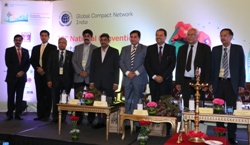
A day long thematic discussions were held on February 14, and included panellists from various sectors taking part in discussions aimed at finding ways to turn the sustainable development vision in to reality and meet the ambitious goal.
Dr. Bhaskar Chatterjee, DG & CEO, IICA in his inaugural address stated that “Sustainability is not about changing the game or changing the players – rather it is about changing the thinking”. It is not sustainability or CSR rather it is sustainability & CSR – one envelopes the other. He also stated, “Corporate and Companies can support with funds, but society plays the role of foot soldiers to bring change”.
The key stakeholders Roundtable on ‘Sustainable Transformation for India: 2015 & Beyond’ moderated by Mr. Vishvesh Prabhakar, MD, India-Strategy & Sustainability Services Accenture included eminent panellists such as Mr. Ashok Kumar Pavadia, Additional Secretary & Adviser Inter-State Council Secretariat, Ministry of Home Affairs, Government of India, Mr. Alok Misra, ED-Chief CSR, Oil & Natural Gas Corporation Ltd, Mr. Babu Rangaswamy, Director-Technology Services HP, Mr. G.S Krishnan Regional President, Novozymes South Asia Pvt Ltd, Prof. J. Philip, President XIME Bangalore, Ms. Sucharita Eashwar, MD-India, Weconnect International and Mr. Tom Thomas, CEO, Praxis.

Elaborating on some of those themes, keynote speakers emphasized a need for an inclusive agenda that would produce results. Echoing a view heard through the day, Mr. Alok Misra, ED-Chief CSR, Oil & Natural Gas Corporation Ltd said “the long and winding road is behind us but clearly here is a long way to go”. With new technologies and partnerships, greater efficiency could lead us towards shared future. And set of tools for a shared future with shared values.
The inaugural session witnessed the launch of “Sustainability Practices: Perspective and Initiatives of leading Indian and Global Businesses”, which includes sustainability practices of 19 companies. In a unique such project on sustainability practices led by Global Compact Network India, nineteen leading Indian and global businesses and 10 CEOs assess their work
through optics of sustainability, sharing their operations, processes and strategies in an emerging business architecture and a new age global economy.
Highlighting on the outcome of the session Mr. Pooran Chandra Pandey, Executive Director, GCNI said “Sustainable transformation now and then would equal transformational leadership and greater connect on ground with people, so essential in driving growth, development and inclusion”.
Plenary
The daylong session focused on Sustainable Transformation, Infrastructural Development-Short term and long term priorities in infrastructure development to support sustainable economic growth, Institutional Transformation- Transforming public and private institutions to overcome challenges faced in administering good governance and the day ended discussing on Inclusive Society- Policy initiatives and collaborative models required to drive broader development and inclusion of marginalized communities.
Session I on Sustainable Transformation for India: 2015 & Beyond
According to Ms. Sucharita Eashwar, MD India, WeConnect International “Women don’t need upliftment, what they need is access that enables economic empowerment”.
Session II on Infrastructure Development: Short term and long term priorities in infrastructure development to support sustainable economic growth
Mr. Govind Ethiraj stated that “Smart cities would be a key to drive growth but would need to embed sustainability in its value chain”
Session III on Institutional Transformation: Transforming public and private institutions to overcome challenges faced in administering ‘good governance’
Mr. P.M. Kumar, observed that “Good governance is key for effective delivery of outcomes to community and other stakeholder”
Session IV on Inclusive Society: Policy initiatives and collaborative models required to drive broader development and inclusion of marginalized communities
Brig Rajiv Williams stated that ‘Collaboration and partnership at our work drives responsible behaviour of businesses towards their key stakeholder’.
“Need of the hour is to integrate sustainability and CSR in the Education system” – Dr. Anand K Joshi, Vice Chancellor
CCI Newswire

































